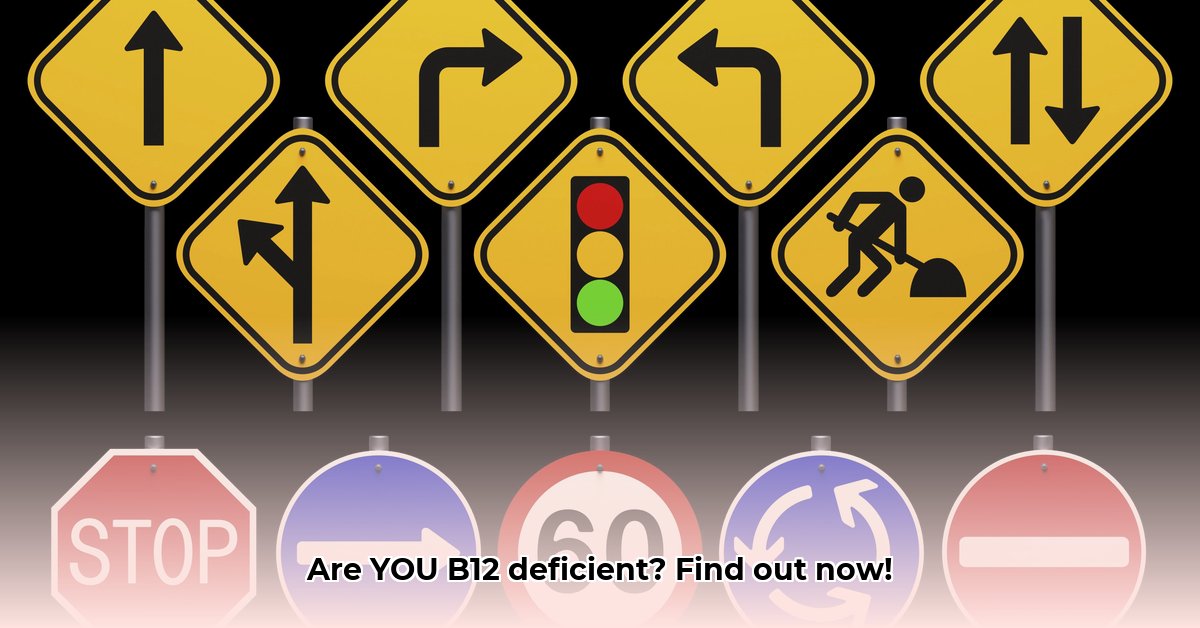
Feeling es (extremely) tired, or experiencing strange tingling sensations? A vitamin B12 deficiency might be the culprit. This article provides a comprehensive guide to understanding, diagnosing, and treating this common condition. We'll explore the symptoms, causes, diagnosis, treatment, and prevention strategies to help you feel your best.
Understanding Vitamin B12 Deficiency
Vitamin B12 is crucial for your nervous system, red blood cell production, and overall health. A deficiency occurs when your body doesn't get enough B12, leading to various symptoms. This is more common than you think, especially amongst older adults and those following specific diets. Early detection is key!
Spotting the Sneaky Symptoms
The symptoms of B12 deficiency often develop gradually, making them easy to miss. They can manifest in various ways:
- Extreme Fatigue (Always Tired): Persistent tiredness, even after a full night's sleep, is a major red flag. Is that morning coffee not cutting it anymore?
- Pale Skin: Noticeable paleness can indicate a reduction in healthy red blood cells.
- Digestive Issues: Persistent diarrhoea or constipation without a clear cause might be your gut's way of signaling a problem.
- Numbness and Tingling (Paraesthesia): This often affects the hands and feet, feeling like pins and needles that don't go away. It's your nervous system crying out for help. Balance problems or clumsiness could also be related. Imagine your nerves struggling to send the right signals.
- Cognitive Issues (Brain Fog): Difficulty concentrating, memory problems, or unexplained mood swings can indicate a B12 deficiency. This "brain fog" can affect your daily life.
- Headaches (More Frequent & Severe): While not all headaches stem from a B12 deficiency, more frequent and intense headaches than usual are worth investigating.
Uncovering the Root Causes
Several factors can lead to B12 deficiency:
- Diet: Strict vegan or vegetarian diets, particularly if not supplemented with fortified foods or B12 supplements, are a common risk factor. A balanced diet is crucial for overall health!
- Age: As we get older, our bodies become less efficient at absorbing B12 from food, increasing our risk.
- Medical Conditions: Conditions like pernicious anaemia (inability to absorb B12), Crohn's disease, coeliac disease, and bariatric surgery impact B12 absorption.
- Medications: Some medications, such as metformin and proton pump inhibitors (PPIs), can interfere with B12 absorption.
Diagnosis and Treatment
Diagnosis involves a simple blood test to measure serum B12 levels. Generally, levels above 300 pg/mL are considered normal, while levels below 200 pg/mL indicate a deficiency. Treatment options include oral supplements or B12 injections, depending on the severity and underlying cause. Regular monitoring of B12 levels is essential, especially during and after treatment.
Did you know that early diagnosis and treatment can prevent serious complications?
The Link Between Metformin and Vitamin B12 Deficiency
Metformin, a common diabetes medication, can sometimes interfere with B12 absorption. This is a valid concern that needs attention!
Understanding the Connection
Metformin can slightly hinder the absorption of B12 in the gut. This is more likely with long-term, high-dose use.
Spotting the Signs
Symptoms associated with Metformin-induced B12 deficiency are similar to general B12 deficiencies and include: extreme tiredness, numbness or tingling, balance problems, memory problems, pale skin, and shortness of breath.
Getting a Diagnosis
A blood test confirms the diagnosis. Your doctor will assess if Metformin is the culprit, and if it is, they can recommend appropriate treatment and monitoring, possibly suggesting a B12 supplement to ensure adequate levels.
What to do if you have a deficiency?
Your healthcare professional will recommend B12 supplements, either through injections or oral pills, depending on the severity. Dietary adjustments may also be advised. Regular check-ups are crucial, especially if you're on Metformin.
Preventing B12 Deficiency
Maintaining adequate B12 levels is possible through various preventative measures:
- Balanced Diet: Include animal products (meat, poultry, fish, eggs, dairy) for optimal B12 intake.
- Fortified Foods & Supplements: Vegetarians and vegans should consider fortified foods or supplements, always under medical guidance.
- Regular Check-ups: Regular check-ups, especially for older adults or those with underlying health issues, aid in early detection.
Remember, maintaining your health is a journey! If you suspect a B12 deficiency, consult your doctor immediately. Early intervention is key to managing this condition effectively.